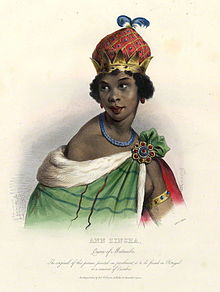| Nzinga | |||||
|---|---|---|---|---|---|
 Posthumous lithograph of Njinga of Ndongo and Matamba by Achille Devéria, 1830s, after a portrait on parchment stored in a convent in Coimbra. National Portrait Gallery, London | |||||
| Queen of Ndongo | |||||
| First reign | 1624–1626 | ||||
| Predecessor | Ngola Mbandi | ||||
| Successor | Hari a Kiluanje | ||||
| Second reign | 1657–1663 | ||||
| Predecessor | Ngola Hari | ||||
| Successor | Barbara | ||||
| Queen of Matamba | |||||
| Reign | 1631–1663 | ||||
| Predecessor | Mwongo Matamba | ||||
| Successor | Barbara | ||||
| Born | c. 1583 Kabasa, Kingdom of Ndongo | ||||
| Died | 17 December 1663 (aged 79–80) Kabasa, Kingdom of Ndongo | ||||
| |||||
| Father | Ngola Kiluanji Mbande | ||||
| Mother | Kangela | ||||
Nzinga Ana de Sousa Mbande (Swahili pronunciation: [n̩ˈʒiŋa]), Nzinga (/nəˈzɪŋɡə/; c. 1583 – 17 December 1663) was a southwest African ruler who ruled as queen of the Ambundu Kingdoms of Ndongo (1624–1663) and Matamba (1631–1663), located in present-day northern Angola.[1] Born into the ruling family of Ndongo, her grandfather Ngola Kilombo Kia Kasenda was the king of Ndongo.
Njinga received military and political training as a child, and she demonstrated an aptitude for defusing political crises as an ambassador to the Portuguese Empire. In 1624, she assumed power over Ndongo after the death of her brother Mbandi. She ruled during a period of rapid growth of the African slave trade and encroachment by the Portuguese Empire in South West Africa.[2]
The Portuguese declared war on Ndongo in 1626 and by 1628, Njinga's army had been severely depleted and they went into exile. In search of allies, she married Imbangala warlord Kasanje. Using this new alliance to rebuild her forces, she conquered the Kingdom of Matamba from 1631 to 1635. In 1641, she entered into an alliance with the Dutch West India Company who had captured Luanda from the Portuguese. Between 1641 and 1644, Njinga was able to reclaim large parts of Ndongo. Alongside the Dutch, she defeated the Portuguese in a number of battles but was unable to take the Fortress of Massangano. In 1648, the Portuguese recaptured Luanda, with the Dutch leaving Angola. Njinga continued to fight the Portuguese until a peace treaty was signed in 1656.[1]
In the centuries since her death, Njinga has been increasingly recognized as a major historical figure in Angola and in the wider Atlantic Creole culture. She is remembered for her intelligence, her political and diplomatic wisdom, and her military tactics.
- ^ a b Elliott, Mary; Hughes, Jazmine (19 August 2019). "A Brief History of Slavery That You Didn't Learn in School". The New York Times. Archived from the original on 20 August 2019. Retrieved 20 August 2019.
- ^ Snethen, J (16 June 2009). "Queen Nzinga (1583–1663)". BlackPast. Archived from the original on 15 October 2019.